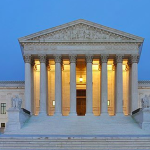Medical schools have been admitting unqualified or barely qualified applicants and dumbing down class content and graduation standards.
Supreme Court
A unanimous Supreme Court decision is a good first step for getting law enforcement out of prescription decisions. Drs. Jeffrey Singer and Josh Bloom in Reason Magazine.
As a native Californian, I was raised being concerned about water. That concern has not changed significantly over my lifetime. As Robert Glennon, a professor of law at the University of Arizona writes, as the drought in the West continues, the battle over water is increasingly being fought in the Courts. The article comes from The Conversation.
On Nov. 25, 2020, the Supreme Court decided Roman Catholic Diocese of Brooklyn v. Andrew Cuomo [1] in a 5-4 ruling. That decision struck down Gov. Cuomo's executive order limiting to ten the number of individuals who could gather in places of worship in hard-hit “red zones.” As COVID's US toll continues to increase and vaccination efforts fumble, we can expect frustrated governors and public health officials to seek to enforce a broader panoply of lockdown orders. The Diocese case teaches a few lessons to assure new orders don’t trespass on the new-found Religious devotion of the Supreme Court.
Did you know all falls are not alike, and why that is the case? Or why every rib fracture is not the same? Here are a few factors that influence prognosis.
A recent Supreme Court case presents the question of whether it's ethical to execute an inmate suffering from dementia, one who can no longer recall the crime.
In a unanimous Supreme Court victory, a young girl with cerebral palsy, Ehlena Fry, and her service dog, Wonder, succeeded in making the ability to pursue justice against discrimination for those managing disabilities that much easier.
While the U.S. Court of Appeals for the NY region threw out a lawsuit by parents seeking to allow religious exemptions for their kids, the matter remained unsettled. Until now. The U.S. Supreme Court has decided not to review the decision, which now puts an end to this debate -- with a welcome outcome.
More and more cases which require an understanding of complex scientific issues are being tried in the courts of this nation. Often the scientific questions that come before a court are on the cutting edge of scientific knowledge. In other cases, the tested theories of mainstream science are in conflict with the hypotheses of researchers who perhaps do not follow traditional methods. Juries and even judges may have a hard time distinguishing reliable expert testimony from pseudoscience; and even reliable research on mice or rats, for example, may not be relevant to determining the causes of human disease.





